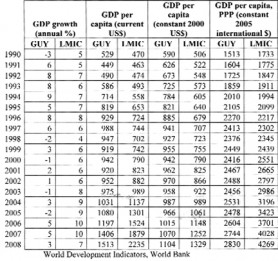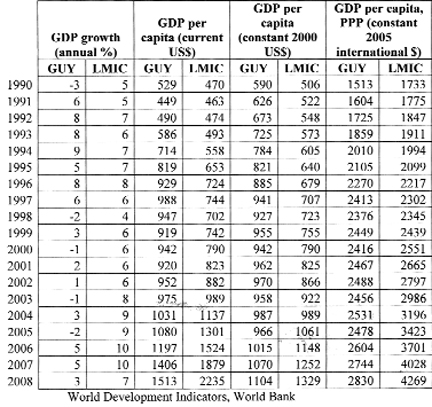Dear Editor,
For those who needed reminding, in his parting comments, the outgoing United Kingdom High Commissioner, Mr Fraser Wheeler, is reported to have said that our “politicised racial divide” is hindering our development and that “all political and civil society players need to find some form of accommodation” (SN, June 27). The fact that, notwithstanding the official hype, Guyana has not been making significant progress is well known and is demonstrated by the following table.
 The World Bank has not yet posted its assessment for 2009 and recently a controversy has developed over the Economic Intelligence Unit’s (EIU) claim that the growth rate for 2009, which the government claimed was 2.3%, was massaged and is really negative at -0.9% (SN, June 28). Unfortunately for the government, the EIU is not the only one to have questioned its growth figure.
The World Bank has not yet posted its assessment for 2009 and recently a controversy has developed over the Economic Intelligence Unit’s (EIU) claim that the growth rate for 2009, which the government claimed was 2.3%, was massaged and is really negative at -0.9% (SN, June 28). Unfortunately for the government, the EIU is not the only one to have questioned its growth figure.
The CIA World Factbook, is even more unkind, estimating that: “Growth turned negative (to -1.7%) in 2009 as a result of the world recession” and even the IMF was most tentative and downgraded the World Bank’s 2008 figure: “Newly released GDP series (re-based to 2006 prices) suggest that economic activity expanded by 3.3 percent in 2009, compared to 2 percent in 2008” (2009 Article IV Consultation with Guyana, 13.4.10).
In my view, if only the question of accuracy was at stake, this controversy would be simply amusing, since there are usually margins of error and these kinds of small percentages are insignificant when one is dealing with an economy with a per capita income of US$1,500. Furthermore, when considering questions of growth and development, isolated numbers are not very useful.
The table above allows us to make comparisons over time and across a relevant category and indicates how unwise it is to consider yearly growth in isolation. It indicates quite clearly that in the midst of growth, there can be decline!
Nonetheless, apart from mere accuracy, I believe that the government has at least four other concerns. Firstly, it is bad for a country and its government’s international reputation for an institution such as the EIU to accuse it of diddling the figures; look where that got Greece. Secondly, these numbers debunk the government’s boast that its prudent management has allowed Guyana to weather the 2008 international financial storm.
Thirdly, Mr Jagdeo is in his last full year of office and would like to leave behind something akin to the Hoyte legacy. After all, Hoyte was a lawyer and Jagdeo is by training an economist. Finally, after eight years of stagnation, reasonable growth was recorded in 2006 (note: the very year the government chose for its “rebase”) and it would have been nice to go into a general election with four years of continuous growth instead of a spike of three years.
These matters aside, it does not take much to see that across all the indicators in the table, by the second half of the 1990s, Guyana began to stagnate and never again reached the consistent levels of growth of the 1991 to 1997 period (an achievement that is now routinely attributed to the initiatives of Desmond Hoyte). What is more telling is that in the so-called ‘Hoyte period,’ Guyana was outperforming the LMICs, but though growth returned in 2006, we are only doing half as well as this category, suggesting that these countries are moving away from us and that even with growth there is a comparative decline!
Most Guyanese will agree that our development has been thwarted by our politicised ethnic context and it is my contention that the impending general elections provide an opportunity to negate this stultifying condition, but only if the leaders of the relevant stakeholders rise to the challenge. A pre-electoral alliance of opposition forces is being mooted and our constitutional rules make such an association critical. However, the alliance framework must be bolstered by sensible policies and sufficient effort. In the past, almost as if throwing history aside, persons have fallen prey to nostalgia, personal ambition, ideologies and routine assumptions. Whatever one may think and do, at this stage it is best to remember that these kinds of elections are ultimately determined by arithmetic and that success will require policies based on innovative hardheaded electoral calculations.
After decades of effort, Freedom House, in its 2008 Report, could still refer to Guyana as a “the poverty-stricken country whose “… informal economy is driven primarily by drug proceeds [that] may be equal to between 50 and 60 percent of formal economic activity.” Mr Wheeler suggested, and I concur, that if we cannot find some accommodation, if our method of governance and doing business does not change soon, our future will be as uninviting as our past.
Yours faithfully,
Henry B Jeffrey










